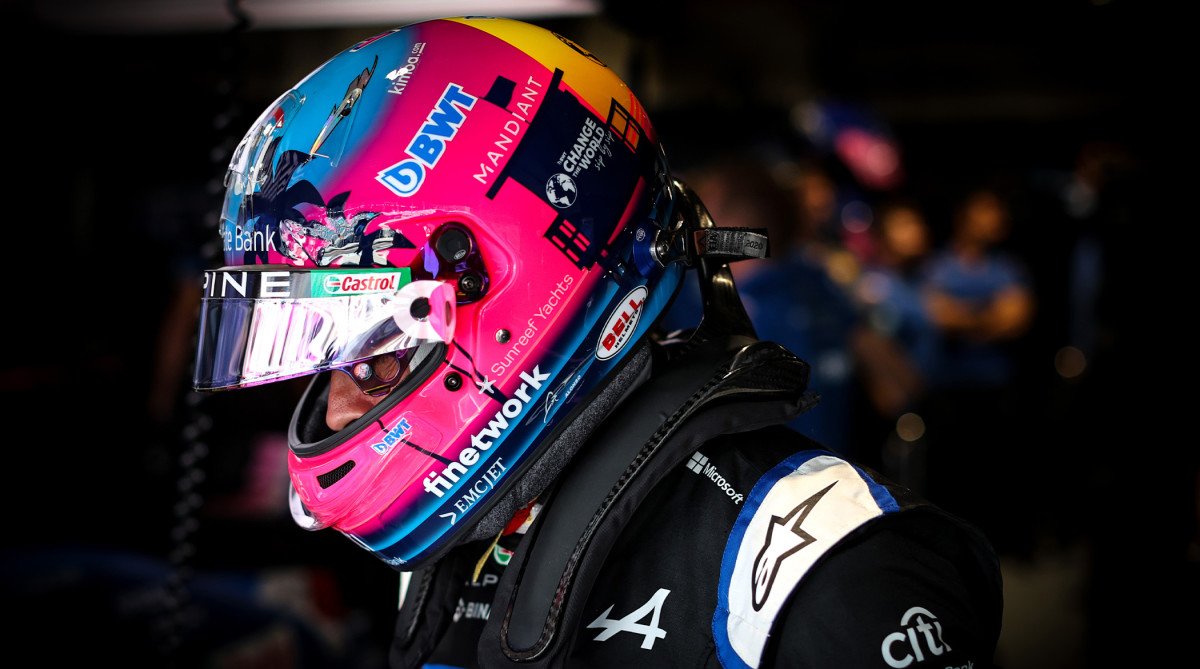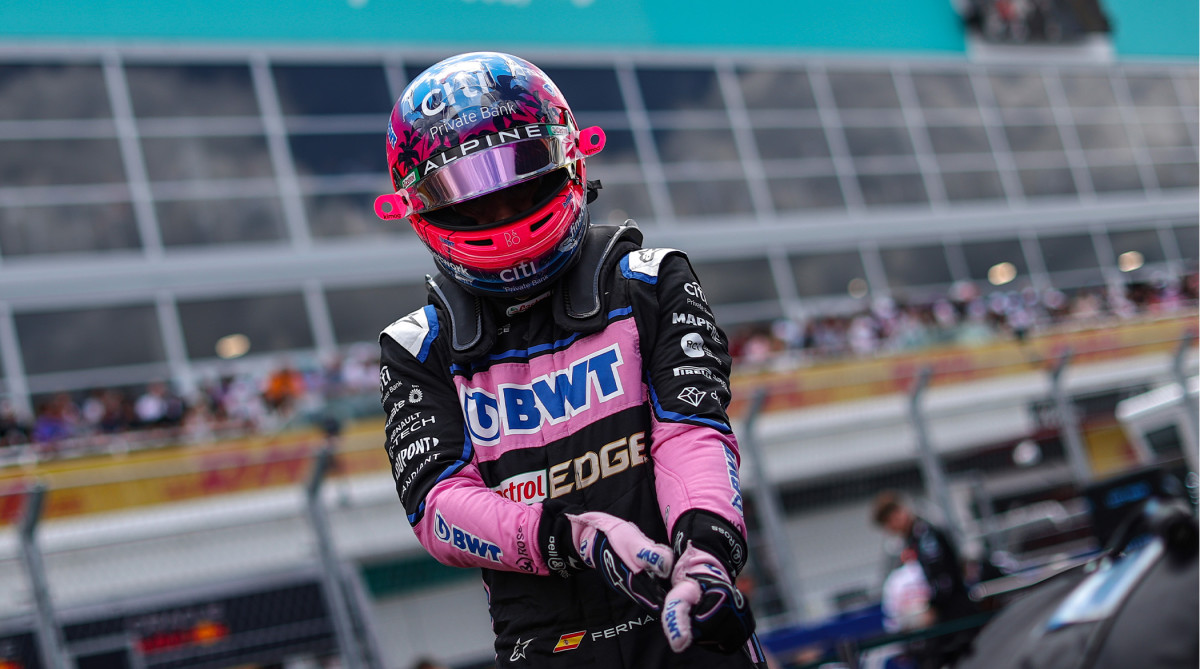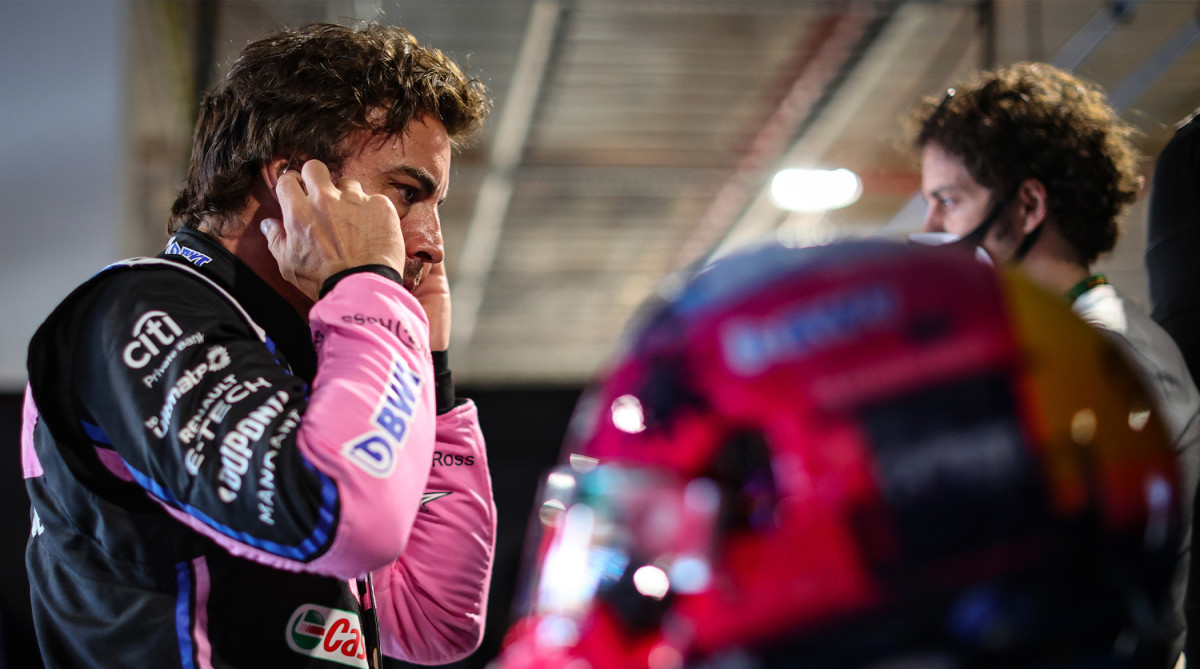Fuel for Thought: F1’s Fernando Alonso on Spanish GP, Advice for Next Generation
Barcelona, home of stunning architecture, lively nightlife and a soccer team holding onto second place in La Liga. And this weekend, it’s Formula One’s playground.
Nestled about 20 minutes northeast of the heart of the city is the Circuit de Barcelona-Catalunya, where one of the oldest races in the world is held. The first Spanish Grand Prix took place in 1913. And it’s the home race for two Spanish greats—Ferrari’s Carlos Sainz and Alpine’s Fernando Alonso.
“It feels good to be in Spain,” the 40-year-old Alonso says, “and we only experience it once a year. Obviously we try to enjoy the weekend and to make the people happy.”
The two-time world champion came from modest beginnings, born almost nine hours away in Oviedo, Spain. He says he didn’t have much of a background in racing, but you wouldn’t be able to tell based on the serial record breaker’s story.
Michael Schumacher dominated the grid in the early 2000s, and it was Alonso who finally topped the F1 king. He became, at the time, F1’s youngest polesitter, race winner, world champion and double world champion.
But after the 2018 season, Alonso took a sabbatical from F1 but not racing. He pocketed two Le Mans wins before returning to the pinnacle of motorsports in ’21.
The Spaniard is coming off of a difficult weekend, going from eighth at the end of the Miami Grand Prix to ninth after receiving a five-second penalty due to his collision with Pierre Gasly. Then FIA stewards handed the Alonso another five-second penalty for leaving the track and gaining an advantage, causing him to fall to P11.
“This one is certainly difficult to accept since Fernando handed back the time during the lap and we were not able to present the evidence to clarify the particular situation before the penalty was issued,” Alpine CEO Laurent Rossi said in a statement.
But now, all eyes are on Barcelona, with Alpine “determined to piece together a much slicker and, a more fair, race weekend and demonstrate the real potential of our package.” As F1 prepares for the race, Sports Illustrated spoke with Alonso about competing in his home country, the best advice he’s received and how he’s a “very normal guy.”

Fuel for Thought is Sports Illustrated’s exclusive Q&A with Formula One’s biggest names. The following questions and answers have been edited for brevity and clarity.
Sports Illustrated: What has been your favorite Spanish Grand Prix?
Fernando Alonso: 2006. We came here as a world champion in 2005, and I remember the grandstands were full with a lot of supporters and we won the race. That was really a magic moment.
SI: What is the fan atmosphere like with it being home track?
FA: It is obviously very special, especially here in Spain. We live Formula One; it’s a football kind of feel. The fans are very passionate, very loud. They are constantly moving, bringing the flags here. So they are not the fans that are just sitting and enjoying the race. They are very active.
SI: How does the atmosphere and the way that the fans are compare to the Miami Grand Prix?
FA: It is different. In Miami, there were lots of VIPs in the paddock and a lot of celebrities. Here, maybe we don’t have as many. But as I said, the fans, they may be more low profile but [they are] very, very passionate about the race. And in Miami was more people enjoying the show but maybe not understanding completely what’s going on in the race.
SI: What stood out to you about Miami?
FA: The whole atmosphere and how the popularity of Formula One has been increasing in the U.S. and how people were embracing that weekend. It’s not only the race track—it was the hotels, it was in the airport, it was in the restaurants. Everyone in the city were so upbeat about the race weekend, and that was a surprise for all of us.

SI: What should we be watching for at Barcelona? What part of the track is the most challenging and why?
FA: The challenge will be the tire degradation. This weekend is a very demanding track for tires, and it’s extremely hot this weekend here in Barcelona. The teams will face some some problems on Sunday, and this could create a good action on track and a little bit of drama on the strategy and the tires. So that could be very interesting on television.
SI: We talk a lot about race strategy and preparing for each weekend. What does that look like for you?
FA: The week of the race we have, very early that week, a lot of meetings just to prepare what we should concentrate on the free practice. What are the new parts that are coming to the to the car compared to previous Grand Prix, and then try to evaluate those on the free practice. Looking at the weather, looking at the challenges, and then on the weekend after the practice is a continuous research of setup, fine tunign and preparing the course. We are in a bubble that we are just constantly talking about technical stuff, and it’s difficult to probably enjoy the feeling of the weekend once you are here.
SI: Are you a superstitious individual?
FA: Not that much. If one race goes well, I try to use that helmet in the following race. Or if I remember that I did something on that Sunday morning, I try to repeat it. But it’s not mandatory.
SI: How would you describe the atmosphere within Alpine this season?
FA: It has been good. Generally, we did improve from last year, where our natural position was between P8 and P12. This year, I think we look more [like a consistent] top five, top seven. So definitely we made a step forward. Not enough because there’s still the first two teams a little bit in their own league, and we need to catch up. Generally, I think we’re moving in the right direction, and everyone is happy with that. Unfortunately, we didn’t score as many points as we probably deserve in the couple of races in the first part of the championship.
SI: How do you kind of shake off those types of weekends?
FA: It is difficult. It has been some rough races so far and rough weekends. You try to pass the page quickly and concentrate on the next one we have. I’m a very competitive person. So when the results are not coming or the luck is not with us, it ... makes me more hungry [to go] back in the car.
SI: Who is Fernando Alonso?
FA: That’s a very, very good question. I’m a very normal guy. Yeah, I do a probably very extraordinary sport and job. Only 20 people in the world can drive Formula One cars, and that’s probably how the people know me and know my name. But on Monday morning when the race is finished, I’m a very normal guy with very loyal friends, loyal family, coming from the north of Spain with not much of a background of motor racing. I’m just here competing because I love racing. But the whole thing around Formula One, maybe it’s not my lifestyle or where I’m coming from.
SI: Where do you see yourself after everything is said and done with Formula One?
FA: I don’t know. I don’t have a plan for that. I took two sabbatical years in 2019 and ’20 outside Formula One, and in that time, I was competing every weekend. I was doing a 24 Hours of Le Mans, and I was doing the 24 Hours of Daytona. I found myself driving every weekend. So I will say that after Formula One, I will find the way to get driving in other categories because that’s what I love to do.

SI: What shows are you binge watching right now or a movie that you would recommend?
FA: Normally all the movies we watch are on planes, because we spend a lot of time traveling. And on the plane, sometimes there are not even updated movies. We used to choose random movies that maybe are 10 years old, 20 years old and are still good to watch. I’m may not be the person to recommend anything that is trendy now.
SI: What is your go to postrace meal?
FA: I try to fly home if I can Sunday nights to spend Monday morning already at home and waking up on my bed. So whatever I can grab in the airport or at home, but I don’t have a special one.
SI: What is your happy place outside of racing or outside of a car?
FA: Sports in general make me happy, and it’s something that I don’t do just for training. I feel like I can enjoy myself. So a happy place outside racing will be my bicycle, on the mountain bike, just alone and spending the morning enjoying the weather.
SI: What is the best piece of advice that you’ve gotten in your career?
FA: One was a typical one, which is enjoy myself, because at the age we start racing, normally we are still kids. We are 14 or 15 and we are racing around the world in different tiers of motorsport. You have to enjoy. If you have too much pressure on those years, if you are not happy when you are driving, you will never deliver the results. That will be the best way to perform at your best—when you are really happy behind the wheel.
Then the second, I remember in go-kart racing, one of my engineers told me that second is the first loser because I finished second in one race. And I was happy for that because I made a good comeback from 10th, and when I arrived to the garage, everyone was not so happy and I was the only one happy. He took me aside, and he said, ’Remember this for the rest of your career: Second is the first loser. I know you made a good comeback, but only the first is the winner and celebrates. Second has nothing to celebrate.’
SI: What is your advice to this next generation of drivers, because they have the added pressure of not just being in Formula One, but they've also got social media and a lot more attention now that keeps growing and growing.
FA: It is more challenging now for the younger generation because they have all the social media and all the pressure from people. Even if they don’t know you or they never saw a race, they still have the power to make some comments or to judge you on your job or results. We are creating an, unfortunately, some artificial war that doesn’t value all the preparation and all the sacrifices that you made all over your career, when you left home when you were 13 or 14 and you sacrifice time with the family, you sacrifice some friends. And there are people that will never understand this because they are able to judge you and to comment on everything, so [the young drivers] need to be careful. I think we need stronger sportsmen than ever before. They need to be very strong, mentally.
More Formula One Coverage:
- F1 Makes Decision on Replacing Russian Grand Prix
- Miami Grand Prix Shows Flashes of What F1's Future Could Be
- Verstappen Wins, Drivers Call for Track Changes: Three Takeaways From Miami
- Red Bull’s Next Chapter Has Verstappen Innovating While Just Being Himself
- Fuel for Thought: Ferrari’s Charles Leclerc on Miami Grand Prix, Playing Piano, More
